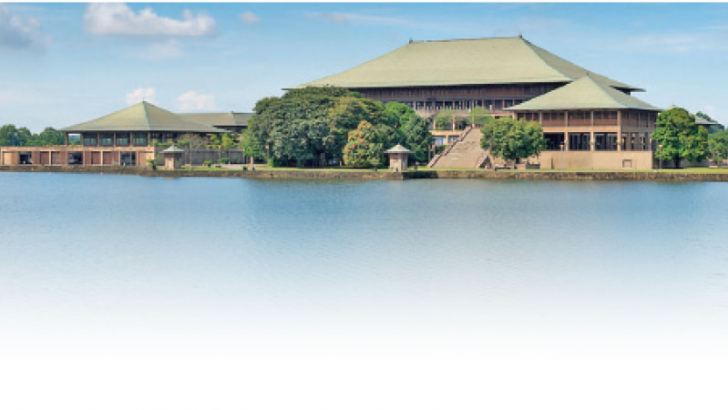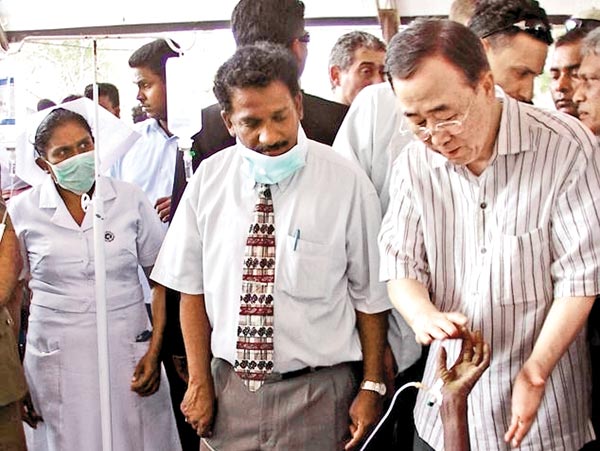 The visit of United Nations Secretary General Ban Ki-moon will shift focus away from the battles within the Sri Lanka Freedom Party (SLFP) as the seasoned diplomat undertakes what would be one of his last major tours before retirement.
The visit of United Nations Secretary General Ban Ki-moon will shift focus away from the battles within the Sri Lanka Freedom Party (SLFP) as the seasoned diplomat undertakes what would be one of his last major tours before retirement.
Ban Ki-moon is no stranger to Sri Lanka. The South Korean first attracted the attention of Sri Lankans when he ran for the office of Secretary General of the United Nations (UN). That was because another Sri Lankan, Jayantha Dhanapala, was also in the fray. Eventually, Dhanapala was to pull out from the race. Ban Ki-moon assumed office as Secretary General on January 1, 2007, and will complete ten years in office when he retires on December 31 this year.
Ki-moon is a career diplomat turned politician. Prior to taking office as Secretary General of the United Nations, he was South Korea’s foreign minister for two years. The South Korean media had dubbed him ‘the slippery eel’, for his ability to dodge questions. At the UN, he has been lampooned for his lack of leadership at a tumultuous time in world history where terrorism has threatened to dictate the world agenda.
Refugee camps in Mullaitivu
This is not Ki-moon’s first visit to Sri Lanka. He first arrived here in 2009 in very different circumstances - shortly after the end of the war with the Liberation Tigers of Tamil Eelam (LTTE), at the invitation of President Mahinda Rajapaksa.
Arriving in the country two weeks after the conflict had officially been declared over, Ki-moon also visited the refugee camps in Mullaitivu. The visit was generally considered a success and a diplomatic victory for Colombo over the Eelamist lobby who were even then crying foul at what they claimed were alleged human rights abuses towards the end of the war.
The joint statement issued by the Government of Sri Lanka and the United Nations at the conclusion of Moon’s visit reflects this. The statement noted that “President Rajapaksa and the Secretary-General agreed that addressing the aspirations and grievances of all communities and working towards a lasting political solution was fundamental to ensuring long-term socio-economic development. The Secretary-General welcomed the assurance of the President of Sri Lanka contained in his statement in Parliament on May 19, 2009, that a national solution acceptable to all sections of people will be evolved. President Rajapaksa expressed his firm resolve to proceed with the implementation of the 13th Amendment, as well as to begin a broader dialogue with all parties, including the Tamil parties in the new circumstances, to further enhance this process and to bring about lasting peace and development in Sri Lanka.”
There was no hint of alleged war crimes in the joint statement. Instead, the only reference to human rights was to note that “Sri Lanka reiterated its strongest commitment to the promotion and protection of human rights, in keeping with international human rights standards and Sri Lanka’s international obligations. The Secretary-General underlined the importance of an accountability process for addressing violations of international humanitarian and human rights law. The Government will take measures to address those grievances.”
It was only many months later that Ban Ki-moon and the UN changed its tune. Ki-moon and the UN have claimed that the Rajapaksa administration failed to take any meaningful steps to address the alleged violations of human rights. That was when the war victory turned into a diplomatic war with the UN.
As pressure grew from the Eelamist lobby as well as some western nations for an international inquiry, Ki-moon appointed a three-member panel of experts in June, 2010, to advise him on accountability issues relating to alleged violations of international human rights and humanitarian law in the final stages of the civil war. The panel was to look into whether the commitment on “human rights accountability” given by President Mahinda Rajapaksa to the UN Secretary General has been implemented.
Darusman Report
This panel comprised of Marzuki Darusman, a former Attorney General of Indonesia, Yasmin Sooka, a high court judge from South Africa and Steven R. Ratner an American Professor of Law. The Sri Lankan government reacted angrily to the panel's appointment, calling it “an unwarranted and unnecessary interference with a sovereign nation”. The panel was not allowed to enter Sri Lanka. The panel's appointment was welcomed by the United States and the European Union but criticised by Russia and China. Before the panel began its sittings, the National Freedom Front Leader and the then Construction Minister Wimal Weerawansa staged a “fast unto death” outside the UN office in Colombo demanding that Moon dissolves the panel and halts the inquiry. Four days in to the fast, President Mahinda Rajapaksa visited him and Weerawansa called off the fast. A few days later, in July 2010, the panel began its sittings.
This panel went ahead with its own inquiry and its findings have been known as the Darusman Report which have been widely criticised in Sri Lanka. The panel noted that it found “credible allegations, which if proven, indicate that a wide range of serious violations of international humanitarian law and international human rights law were committed both by the Government of Sri Lanka and the LTTE, some of which would amount to war crimes and crimes against humanity”.
The Sri Lankan government issued a short statement on April 13, 2011, which condemned the report as “fundamentally flawed in many respects” and based on “patently biased material which is presented without any verification”.
Later, the government elaborated on its criticisms of the report stating that it was characterized by “fundamental deficiencies, inherent prejudices and malicious intentions” and that it was “legally, morally and substantively flawed”. Even the United National Party (UNP), then in opposition rejected the findings of the report noting that it was an “unwarranted interference”.
Later, as pressure from the international community grew, the Sri Lankan Government appointed the Lessons Learnt and Reconciliation Commission (LLRC) to inquire into some of the disputed issues in the final phase of the war.
In the intervening years, Sri Lanka has been battling resolutions at the United Nations Human Rights Council (UNHRC) almost every year until the present government came in to office. This was because the Rajapaksa government adopted a hard-line stance at the UN, contesting the resolutions moved on the issue of accountability for war crimes.
Rajapaksa camp of politics
The present government has changed that strategy. It is more accommodating and co-sponsored a resolution moved by the United States at the UNHRC. The government sees this as the more practical way of dealing with the issue while others- notably from the Rajapaksa camp of politics- have been critical of this change of direction.
The current status is one where Sri Lanka has agreed in principle to an inquiry into alleged war time incidents but insists that any such inquiry will be a domestic one where foreign involvement will be limited to observation and providing expertise.
The Eelamist lobby, of course, is not satisfied and wants a fully-fledged international probe.
It is in such a context Ban Ki-moon is visiting our shores again. This is not likely to be a contentious visit even if the outgoing Secretary General is also due to visit Jaffna. While Ki-moon will have talks with President Maithripala Sirisena and Prime Minister Ranil Wickremesinghe, it is understood he has declined a request to meet with Northern Province Chief Minister C V Vigneswaran.
It is unlikely that controversy will erupt at this visit by the Secretary General. Although retiring from the UN, Ki-moon is rumoured to be eyeing the Presidency in his native South Korea.
Whatever his ambitions, his visit is likely to be a reflection of the thawing relations between Colombo and the UN under the present government and if anyone is expecting a diplomatic tussle, they will be disappointed.




Add new comment